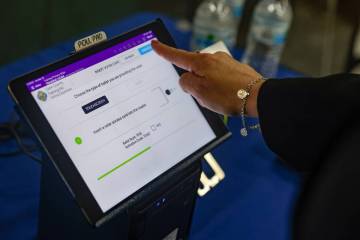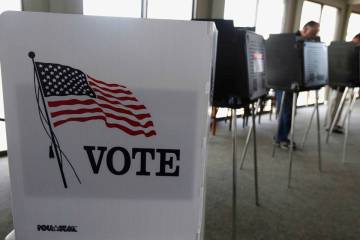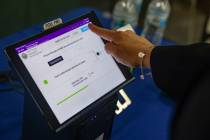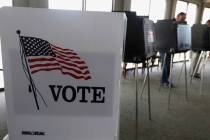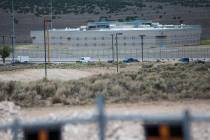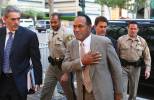Families of crime victims testify for state DNA testing bill
CARSON CITY — The mothers of two murdered college students and the father of rescued kidnap victim Elizabeth Smart testified Thursday that hundreds of lives would be saved and falsely convicted inmates would be exonerated if the Nevada Legislature approves a bill to require anyone arrested for a felony crime to give a DNA cheek swab to police.
“I know this bill will not bring her back or bring my family justice,” Bridgette Denison told members of the Senate Judiciary Committee. But she said daughter Brianna could have been alive today if the bill had been law when she died in 2008.
“DNA is the fingerprint of the 21st century,” said Jayann Sepich, mother of Katie Sepich, whose murder in New Mexico in 2003 led to the passage this year of the federal Katie Sepich law, which appropriates $30 million to help states with DNA costs.
“Our children are our future,” said Ed Smart, the father of Utah kidnapping victim Elizabeth Smart. “I am fortunate we did not lose Elizabeth. But this does not have to happen again to anyone.”
Dozens of witnesses, including the Las Vegas and Reno police departments, testified for Senate Bill 243, which would require the taking of DNA from anyone arrested in a felony crime. Portions of the DNA then would be sent to the national FBI lab to determine whether it matches records in its system.
State law requires the taking of DNA only when someone is convicted of a felony.
Judiciary Chairman Tick Segerblom, D-Las Vegas, predicted after the meeting that the bill will pass after members agree on amendments.
Sen. Aaron Ford, D-Las Vegas, said he wants to work on an amendment to reduce the possibility of some police falsely targeting minorities for arrests so they can secure their DNA.
But he added his cousin, Dallas District Attorney Craig Watkins, has convicted more than 20 people in Texas through DNA.
Brianna Denison, a 19-year-old college student, was kidnapped from a home where she was sleeping near the University of Nevada, Reno. She was raped and killed. James Biela later was arrested and sentenced to death for the murder and the rape of another woman.
His DNA had been taken from a crime scene before Denison’s death and sent to the Washoe County crime lab but never processed because in part of a lack of funds. After Denison’s death, Reno residents quickly donated $180,000 to clear up the DNA backlog.
Katie Sepich, a 22-year-old New Mexico State University college student, was killed in 2003. Her killer was discovered three years later after the state required prisoners to give DNA samples. He had been convicted of another crime after killing the young woman. Susan Martinez, the district attorney who prosecuted him, later was elected governor.
Smart’s daughter, Elizabeth, then 14, was abducted from the bedroom of her Salt Lake City home in 2002. She was found alive nine months later. Brian Mitchell received a life sentence for the crime.
After the hearing, Smart said his daughter, who married last year, is doing fine.
Bridgette Denison was so overcome by emotion Thursday that she had her sister-in-law read her statement to legislators.
Representatives of the American Civil Liberties Union, public defenders and the National Association for the Advancement of Colored People opposed the bill, although expressing sympathy for victims.
Vanessa Spinazola of the ACLU said 86,000 people were arrested in Nevada in 2007 and 13,000 convicted. She said it would be difficult to expunge the DNA from the records if people never are charged or found innocent.
But Sen. Justin Jones, D-Las Vegas, suggested giving released prisoners or those not charged forms to facilitate having their DNA samples destroyed and records cleaned.
Although he supports the bill, a Las Vegas DNA lab technician predicted it would lead to 17,000 more people being swabbed for DNA at an average cost of $75, or $127,500 a year.
But Sepich said later that the average DNA test costs $30 and that Spinazola cited all arrests, not just felony arrests, in her testimony.
Sen. Greg Brower, R-Reno, called SB243 the “most important criminal justice bill the Legislature has considered in decades.” He was the U.S. attorney for Nevada at the time of Brianna Denison’s death.
Contact Capital Bureau Chief Ed Vogel at evogel@reviewjournal.com or 775-687-3901.




